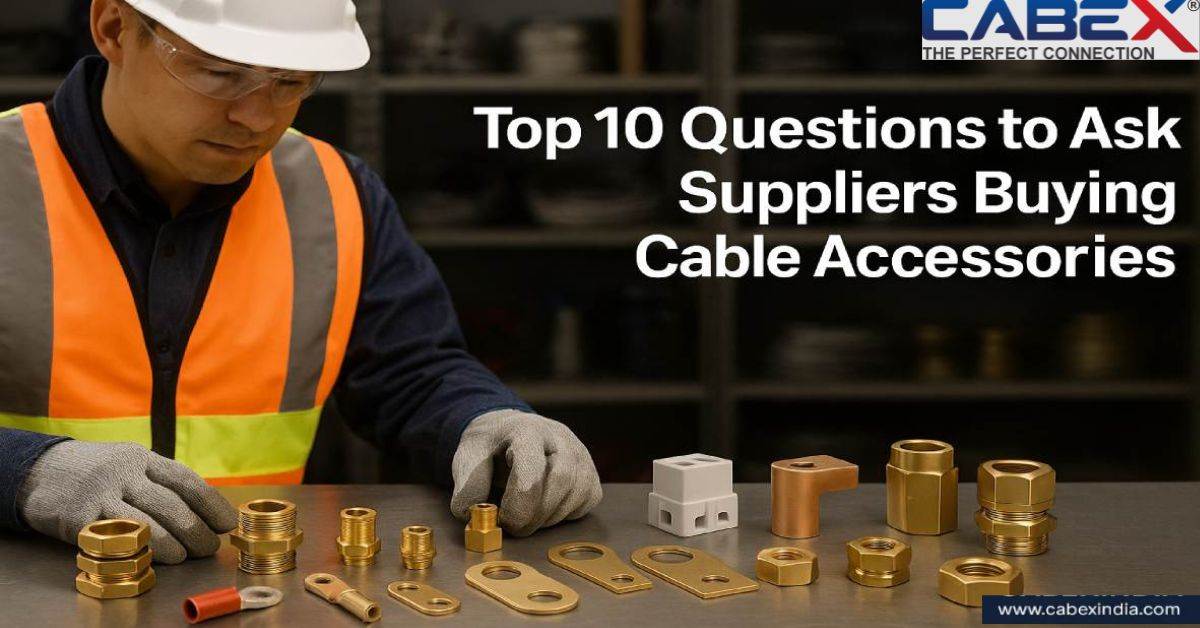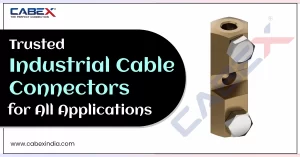Introduction
Choosing the right Cable accessories is mission-critical for safe, reliable, and future-ready industrial installations. With global supply chain complexity, tighter regulations, and rapid technology advancement, B2B buyers must confidently assess suppliers on more than price—prioritizing standards compliance, material quality, trustworthy track records, and robust support.
Drawing on CabexIndia’s direct experience as a leading manufacturer and exporter to regulated markets (Europe, Middle East, Australia), this guide reveals the ten essential, evidence-backed questions you should ask before ordering cable glands, connectors, earthing, or lightning protection accessories for any industrial or hazardous environment.
1. What Global and Local Standards Do Your Cable Accessories Comply With?
Before trusting any supplier, demand explicit proof of compliance with standards such as IECEx, ATEX, UL, IS/IEC, and RoHS—especially for hazardous or international sites. For example, CabexIndia provides detailed certification documents with each shipment and supports customer audits.
Checklist:
- Request up-to-date certificates (not expired/forged).
- Confirm independent testing (not just manufacturer “claims”).
- For export, verify regional variants (EU, Middle East, Australia).
2. Can You Provide Complete Material Traceability and Test Results?
Quality is non-negotiable. Ask for full batch traceability (origin, batch, inspection logs) and recent 3rd-party mechanical/electrical test reports. Demand specifics:
- Exact brass/stainless grade (with EN/ISO code).
- Sealing compound specs (silicone, polymer).
- Recent lab test results (tensile, corrosion, IP ratings).
Industrial Example:
A recent European EPC client rejected a low-cost supplier after a random tensile test failed—CabexIndia’s full trace report and certified results secured the contract.
3. What Is Your Track Record of Supplying for Similar Industries/Projects?
Request project references, ideally similar to your sector (oil/gas, solar, mining, manufacturing). Real-world experience signals reliability under operating pressures.
- Which major companies have used your products?
- Any documented success in hazardous, high-volume or custom jobs?
Case Example:
CabexIndia regularly supplies top EPC contractors for refineries and metro rail electrification—providing references on request.
4. What Is Your Typical Lead Time and How Is Delivery Guaranteed?
In 2025, timely delivery is essential amid global supply chain pressure.
- Ask for typical lead times by quantity/product.
- Verify emergency/expedited logistics options.
- Check for documented on-time delivery rates (ask for metrics).
5. How Do You Support After-Sales: Installation Help, Documentation, and Spare Parts?
True suppliers don’t “disappear” after payment.
- Do they provide detailed installation manuals and access to technical experts?
- Is spare parts support guaranteed for several years?
- Is there a dedicated support line (phone/email/WhatsApp) for urgent queries?
- Downloadable manuals, real-time chat, and long-term customer-support guarantees for industrial buyers worldwide.
6. What Customization Options Are Available for Unique Project Needs?
Can the supplier meet bespoke requirements:
- Custom thread types/sizes
- Material/specification adaptations (e.g., non-standard IP, increased corrosion resistance)
- Branding/laser marking
Ask for successful customization project examples and minimum order requirements.
7. What Price Structures and Bulk/Export Discounts Are Offered?
Commercial buyers should negotiate:
- Transparent price breakdowns (including tax, duties)
- Volume discounts, FOB/CIF options
- Currency flexibility for global buyers
Tip: Focus on total cost of ownership, including logistics, not just “per-piece” price.
8. How Is Product Authenticity and Anti-Counterfeiting Ensured?
Request details of:
- Security features: holograms, QR-coded packaging, or blockchain proof.
- Company registration and reputable global presence (not just a website).
- Warranty/guarantee documentation.
9. What Technical Support and Training Do You Provide for Installers/EPC Teams?
Professional suppliers offer:
- Onsite or virtual training.
- Step-by-step installation guides/videos.
- Troubleshooting support during complex projects.
- Certification for teams (ideal for ISO/OSHA compliance).
10. Can You Share Testimonials, Case Studies, or Independent Reviews?
Ask for transparent case studies, verifiable testimonials, and links to independent third-party reviews.
- Seek quantifiable results: e.g., “Reduced installation time by 30% in XYZ oil refinery.”
- Independently verified reviews (not just self-published “praise”).
Real-World Table: Supplier Questions & What to Look For
| Question | Red Flag Response | Green Flag Response |
| Show certifications? | “We comply” | PDF/test reports, cert links |
| Lead time? | “Depends” | “7–10 days, 98% on-time record” |
| Case studies? | “Confidential” | “Here are 3 similar projects” |
| Customization? | “No, only standard” | “Yes, min order 100, here’s sample” |
Technical/Commercial Recommendations
- Material Selection: For chemical/explosive zones, use ATEX/IECEx-certified brass or stainless-steel glands; for cost-sensitive or temporary installations, industrial plastic (PA66/nylon).
- Environment: For outdoors, demand IP68/IP69K ratings, UV/chemical resistance.
- High-traffic B2B: Always opt for a supplier with real international trade/export credentials and transparent documentation.
Internal Resource Links:
Conclusion:
Modern B2B Cable accessory buyers operate in a risk-driven, global marketplace. Only partner with suppliers—like CabexIndia—who demonstrate verifiable technical expertise, complete compliance, real-world case studies, and deep customer support. Asking these ten questions ensures not only safer installations and regulatory compliance but also maximizes your investment and competitive advantage in the industrial sector.
FAQs
Q1: How do I verify if a cable accessory supplier really holds ATEX or IECEx certification in 2025?
A: Only trust certificates with serial numbers/dates, confirm on official ATEX/IECEx registers, and request direct third-party test results.
Q2: What are common causes of failure in industrial cable glands, and can a reputable supplier prevent them?
A: Major causes: subpar material, poor IP sealing, and wrong installation. Trusted suppliers offer certified grades, live technical help, and clear guides.
Q3: How do I ensure consistent quality across bulk orders or phased project deliveries?
A: Deal with suppliers who maintain batch traceability, offer random sampling/results, and have a proven track record with similar volume exports.
You May Also Like: Maintenance Best Practices for Cable Glands , Buy Explosion Proof Cable Glands Online





